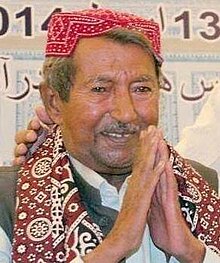Abdul Wahid Arisar (Sindhi: عبد الواحد آريسر) (11 October 1949 – 3 May 2015) was a notable scholar, writer, researcher and Sindhi politician who was one of the heads of the Jeay Sindh Qaumi Mahaz (JSQM), a political party in Sindh.[1] It was reported that there were significant "differences" between Arisar and the head of another faction in the JSQM, Bashir Qureshi.[2] Arisar had previously been chairman of the party in the 1990s.Arisar was student in Madrasa near his village one day his teacher given him a book of G. M. Syed "Maujooda Siyasi soorat e Haal" Aresar was impressed by GM Syed's writing and started paying attention towards politics and mysticism (Sufism) rather than going to madrasa. Arisar's image in Sindhi youth is of intellectual and one of the respected personalities ever lived in Sindh. Arisar translated the novel of Frantz Fanon, "The Wretched of the Earth"in Sindhi, "Mitti hara marho" which became one of his popular works.[3][4]
Abdul Wahid Arisar | |
|---|---|
| عبدالواحد آريسر | |
 | |
| Born | Abdul Wahid Arisar 11 October 1949 Village Waoori, District: Umarkot |
| Died | 3 May 2015 (aged 65) |
| Resting place | Buried at Village Unar Abad, District: Umarkot |
| Other names | Arisar, Molvi Abdul Wahid Arisar |
| Education | Molvi Arabic |
| Alma mater | Primary School Sabho, Bhendo Shareef, Madarsa Hashmia Sujawal, Madarsa Muftah-ul-Uloom Hyderabad, Shah Waliullah Academy Hyderabad, Orintiel College Hyderabad |
| Known for | Leadership of Jeay Sindh Qaumi Mahaz, philosophy of Peace |
| Movement | Sindhudesh movement |
| Spouse | Kaisar |
| Children | 1 |
Bibliography
editThe following is a list of books written by Abdul Wahid Arisar, including his prison diaries, reviews and his research work, as well as writings on his struggle for freedom.
| S # | Roman Name | Books | Year of Publication |
|---|---|---|---|
| 1 | Pirih jo Pegham (Addresses) | Sindhi: پره جو پيغام | 1974 |
| 2 | Sadyun Joon Sadaoon (Addresses) | صدين جون صدائون | 1976 |
| 3 | Sarr Main Sanjhi Wer | سر ۾ سانجھي وير | 1979 |
| 4 | Warya Waheroo | وريا واهيرو | 1981 |
| 5 | Mitti’a Hana Manhoon
(Translation of The Wretched of the Earth) |
مٽيءَ هاڻا ماڻهو | 1983 |
| 6 | Tahki Nikta Tooh | ٽهڪي نڪتا ٽوهه | 1985 |
| 7 | Taram yatra (Jail Diary) | ترم ياترا (جيل ڊائري) | 1985 |
| 8 | Mariyun Maryus Keenaki (Jail Diary) | ماڙين ماريس ڪينڪي (جيل ڊائري) | 1985 |
| 9 | Sindhi Samaj jo Jaezo | سنڌي سماج جو جائزو | 1985 |
| 10 | G M Syed | جي ايم سيد (شخصيت ۽ فڪر) | 1986 |
| 11 | Thee na Muhabbat Maat | ٿي نه محبت مات | 1986 |
| 12 | Mujeeb ain Bhutto | مجيب ۽ ڀٽو | 1987 |
| 13 | Rabiul Awwal ja char chand | (Four crescents of Rabiul Awwal) ربيع الاول جا چار چنڊ |
1966 |
| 14 | Weragi Jy Wanjna Hua | ويراڳي جي وڃڻا ها | 2015 |
| 15 | Chaa te Shakhs Ho | ڇا ته شخص هو | 1978 |
| 16 | Gichi Ganha Looh Ja | ڳچيءَ ڳانا لوه جا | |
| 17 | Qoumi Tahreek Aii Qomi tahreek me Rukawatoon | قومي تحريڪ ۽ قومي تحريڪ ۾ روڪاوٽون | |
| 18 | Vrrk Vrrk Tareekh | ورق ورق تاريخ | |
| 19 | Baakh Jo Aawaz | باک جو آواز | |
| 20 | Chandokiyon aii Chet | چانڊوڪيون ۽ چيٽ | |
| 21 | Umeed Jo Qatul | اميد جو قتل | |
| 22 | Nae Door ja nawa Chaar darwesh | نئين دور جا نوان چار درويش |
-| |
Death
editArisar was suffering from kidney disorder, he had been under treatment in a private hospital at Hyderabad, when his ailment became so severe that he was brought to Karachi and died in Karachi, Pakistan at the aged of 65 on 3 May 2015.[5][6]
See also
editReferences
edit- ^ "Shoot-at-sight in Sindh; Taliban tells people to return to Swat". The Indian Express. May 26, 2009. Retrieved October 28, 2010.
- ^ "GM Syed death anniversary". Daily Times. April 25, 2007. Archived from the original on October 20, 2012. Retrieved October 28, 2010.
- ^ "HYDERABAD: JSQM to launch protest drive: Arrest of party leaders". DAWN. March 17, 2002. Retrieved October 28, 2010.
- ^ "Abdul Wahid Arisar". Pakistan & Gulf Economist. 15 (18–26). S. Akhtar Ali: 34, 37. 1996.
- ^ "JSQM leader Abdul Wahid Arisar passes away aged 65". thenewstribe.com.
- ^ "JSQM-A chief Arisar passes away". pakistanpost.pk. Retrieved 21 May 2016.